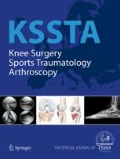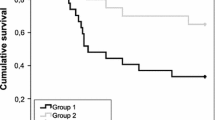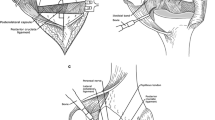Abstract
Both mechanical shavers and radiofrequency-based devices are used to treat symptomatic partial thickness chondral lesions. Controversy exists as to which mode of treatment provides better outcomes. The purpose of this study was to compare clinical results after bipolar radiofrequency-based chondroplasty (RFC) to mechanical shaver debridement (MSD). Patients (n = 60) included in the study presented with knee pain associated with a medial meniscus tear and idiopathic ICRS grade III defect of the medial femoral condyle. Patients who had osteoarthritis, grade II or higher cartilage defects of the tibial joint surface, the lateral compartment, or the femoro-patellar joint, or had previously undergone surgery on the affected knee were excluded. Patients underwent partial meniscectomy; during the procedure, they were randomly assigned to receive bipolar RFC (Paragon, ArthroCare Corporation, Austin, TX) or MSD (Full radius resector LR 4.85 × 12.5 cm), Arthrex, Naples, FL). Postoperatively, the same physiotherapist provided instructions for a daily 2-h home training program consisting of isometric, isotonic, and leg lifting exercises; patients were provided the option of using crutches. Clinical outcomes were assessed using the Tegner score, visual analogue scale (VAS) score, and Knee and Osteoarthritis Outcome Score (KOOS) assessment, which consists of five principal domains including pain, symptoms, function in daily living (ADL), and knee related quality of life (QOL), where a score of 0 indicates extreme symptoms and 100 represents no symptoms. Age and time from injury onset did not differ significantly between the RFC and MSD groups (43 ± 10 vs. 44 ± 9 years, P = 0.732; 8 ± 3 vs. 7 ± 4 months, P = 0.279). No complications or adverse events were observed. Preoperatively, mean (±SD) scores for all KOOS principal domains were <20 and did not differ significantly (P > 0.05) between treatment groups. Postoperatively, the RFC patients returned to activity significantly earlier than MSD patients (17 ± 7 vs. 22 ± 6 days, P = 0.002). VAS pain scores at 6 h, 24 h, 6 weeks, and 1 year were significantly (P < 0.001) lower for the RFC group than for the MSD group (4 ± 2, 2 ± 0.5, 2 ± 1, 2 ± 1 vs. 8 ± 1, 4 ± 1, 4 ± 1, 3 ± 1, respectively). At 1 year, RFC patients had significantly better Tegner score (4.1 ± 0.8 vs. 2.8 ± 0.6, P < 0.001) and KOOS domain scores for pain, symptoms, ADL, QOL, respectively (81.1 ± 8, vs. 59.4 ± 12.8; 80.7 ± 7.5 vs. 59.6 ± 7.5; 81.5 ± 6.5 vs. 60.1 ± 6.9; 80 ± 10 vs. 61.3 ± 12.5; P < 0.001) than MSD patients. Significantly fewer RFC patients (2% vs 23%, p = 0.026) reported using NSAIDS for knee pain at 1 year. Patients undergoing radiofrequency-based chondroplasty for ICRS grade III medial femoral condyle chondral lesions in conjunction with partial meniscectomy had significantly better clinical outcomes through 1 year than patients with similar pathology receiving chondral debridement using the mechanical shaver.






Similar content being viewed by others
References
Alford JW, Cole BJ (2005) Cartilage restoration, part 1: basic science, historical perspective, patient evaluation, and treatment options. Am J Sports Med 33:295–306
Amiel D, Ball ST, Tasto JP (2004) Chondrocyte viability and metabolic activity after treatment of bovine articular cartilage with bipolar radiofrequency: an in vitro study. Arthroscopy 20:503–510
Brittberg M, Winalski CS (2003) Evaluation of cartilage injuries and repair. J Bone Joint Surg Am 85-A(Suppl 2):58–69
Burmann MS, Finkelstein H, Mayer L (1934) Arthroscopy of the knee. J Bone Joint Surg Br 255–268
Caffey S, McPherson E, Moore B, Hedman T, Vangsness CT Jr (2005) Effects of radiofrequency energy on human articular cartilage: an analysis of 5 systems. Am J Sports Med 33:1035–1039
Caplan AI, Elyaderani M, Mochizuki Y, Wakitani S, Goldberg VM (1997) Principles of cartilage repair and regeneration. Clin Orthop Relat Res 254–269
Cronk CE, Roche AF (1991) Reference data for obesity 1. Am J Clin Nutr 54:953–956
Curl WW, Krome J, Gordon ES, Rushing J, Smith BP, Poehling GG (1997) Cartilage injuries: a review of 31,516 knee arthroscopies. Arthroscopy 13:456–460
Dandy DJ (1990) The arthroscopic anatomy of symptomatic meniscal lesions. J Bone Joint Surg Br 72:628–633
Edwards RB III, Lu Y, Nho S, Cole BJ, Markel MD (2002) Thermal chondroplasty of chondromalacic human cartilage. An ex vivo comparison of bipolar and monopolar radiofrequency devices. Am J Sports Med 30:90–97
Englund M, Lohmander LS (2004) Risk factors for symptomatic knee osteoarthritis fifteen to twenty-two years after meniscectomy. Arthritis Rheum 50:2811–2819
Fagerstrom K (2003) New perspectives in the treatment of tobacco dependence. Monaldi Arch Chest Dis 60:179–183
Hunziker EB (2002) Articular cartilage repair: basic science and clinical progress. A review of the current status and prospects. Osteoarthr Cartil 10:432–463
Hunziker EB, Quinn TM (2003) Surgical removal of articular cartilage leads to loss of chondrocytes from cartilage bordering the wound edge. J Bone Joint Surg Am 85-A(Suppl 2):85–92
Kaplan L, Uribe JW (2000) The acute effects of radiofrequency energy in articular cartilage: an in vitro study. Arthroscopy 16:2–5
Karim A, Pandit H, Murray J, Wandless F, Thomas NP (2006) Smoking and reconstruction of the anterior cruciate ligament. J Bone Joint Surg Br 88:1027–1031
Kellgren JH, Lawrence JS (1957) Radiological assessment of osteo-arthrosis. Ann Rheum Dis 16:494–502
Lu Y, Edwards RB III, Kalscheur VL, Nho S, Cole BJ, Markel MD (2001) Effect of bipolar radiofrequency energy on human articular cartilage. Comparison of confocal laser microscopy and light microscopy. Arthroscopy 17:117–123
Lu Y, Edwards RB III, Nho S, Heiner JP, Cole BJ, Markel MD (2002) Thermal chondroplasty with bipolar and monopolar radiofrequency energy: effect of treatment time on chondrocyte death and surface contouring. Arthroscopy 18:779–788
Magnuson PB (1941) Joint debridement. Surgical treatment of degenerative arthritis. Surg Gynecol Obstet 1–9
Mandelbaum BR, Browne JE, Fu F, Micheli L, Mosely JB Jr, Erggelet C, Minas T, Peterson L (1998) Articular cartilage lesions of the knee. Am J Sports Med 26:853–861
Messner K, Maletius W (1996) The long-term prognosis for severe damage to weight-bearing cartilage in the knee: a 14-year clinical and radiographic follow-up in 28 young athletes. Acta Orthop Scand 67:165–168
Mitchell ME, Kidd D, Lotto ML, Lorang DM, Dupree DM, Wright EJ, Lubowitz JH (2006) Determination of factors influencing tissue effect of thermal chondroplasty: an ex vivo investigation. Arthroscopy 22:351–355
Mithoefer K, Williams RJ III, Warren RF, Potter HG, Spock CR, Jones EC, Wickiewicz TL, Marx RG (2005) The microfracture technique for the treatment of articular cartilage lesions in the knee. A prospective cohort study. J Bone Joint Surg Am 87:1911–1920
Moseley JB, O’Malley K, Petersen NJ, Menke TJ, Brody BA, Kuykendall DH, Hollingsworth JC, Ashton CM,Wray NP (2003) Arthroscopic lavage or debridement did not reduce pain more than placebo did in patients with osteoarthritis. J Bone Joint Surg Am 85-A:387
Owens BD, Stickles BJ, Balikian P, Busconi BD (2002) Prospective analysis of radiofrequency versus mechanical debridement of isolated patellar chondral lesions. Arthroscopy 18:151–155
Peterfy CG, Guermazi A, Zaim S, Tirman PF, Miaux Y, White D, Kothari M, Lu Y, Fye K, Zhao S, Genant HK (2004) Whole-organ magnetic resonance imaging score (WORMS) of the knee in osteoarthritis. Osteoarthr Cartil 12:177–190
Roos EM, Roos HP, Lohmander LS, Ekdahl C, Beynnon BD (1998) knee injury and osteoarthritis outcome score (KOOS)–development of a self-administered outcome measure. J Orthop Sports Phys Ther 28:88–96
Roos EM, Roos HP, Ryd L, Lohmander LS (2000) Substantial disability 3 months after arthroscopic partial meniscectomy: a prospective study of patient-relevant outcomes. Arthroscopy 16:619–626
Sharma L, Cahue S, Song J, Hayes K, Pai YC, Dunlop D (2003) Physical functioning over three years in knee osteoarthritis: role of psychosocial, local mechanical, and neuromuscular factors. Arthritis Rheum 48:3359–3370
Shelbourne KD, Jari S, Gray T (2003) Outcome of untreated traumatic articular cartilage defects of the knee: a natural history study. J Bone Joint Surg Am 85-A(Suppl 2):8–16
Spahn G, Frober R, Linss W (2006) Treatment of chondral defects by hydro jet. Results of a preliminary scanning electron microscopic evaluation. Arch Orthop Trauma Surg 126:223–227
Spahn G, Kirschbaum S, Kahl E (2006) Factors that influence high tibial osteotomy results in patients with medial gonarthritis: a score to predict the results. Osteoarthr Cartil 14:190–195
Spahn G, Muckley T, Kahl E, Hofmann GO (2006) Factors affecting the outcome of arthroscopy in medial-compartment osteoarthritis of the knee. Arthroscopy 22:1233–1240
Spahn G, Wittig R (2002) Short-term effects of different arthroscopis techniques in the treatment of chondral defects (shaving, coblation, and microfracturing). Eur J Trauma 28:349–354
Stalder KR, McMillen DF, Woloszko J (2005) Electrosurgical plasmas. J Phys D: Appl Phys 38:1728–1738
Stalder KR, Woloszko J, Brown IG, Smith CD (2001) Repetitive plasma discharges in saline solutions. Appl Phys Lett 79:4503–4505
Stein DT, Ricciardi CA, Viehe T (2002) The effectiveness of the use of electrocautery with chondroplasty in treating chondromalacic lesions: a randomized prospective study. Arthroscopy 18:190–193
Tegner Y, Lysholm J (1985) Rating systems in the evaluation of knee ligament injuries. Clin Orthop 43–49
Voloshin I, DeHaven KE, Steadman JR (2005) Second-look arthroscopic observations after radiofrequency treatment of partial thickness articular cartilage defects in human knees: report of four cases. J Knee Surg 18:116–122
Webb R, Brammah T, Lunt M, Urwin M, Allison T, Symmons D (2004) Opportunities for prevention of “clinically significant” knee pain: results from a population-based cross sectional survey. J Public Health (Oxf) 26:277–284
Wienecke H, Lobenhoffer P (2003) Basic principles of radiosurgical systems and their applications in arthroscopy. Unfallchirurg 106:2–12
Woloszko J, Stalder KR, Brown IG (2002) Plasma characteristics of repetitively-pulsed electrical discharges in saline solutions used for surgical procedures. IEEE Trans Plasma Sci 30:1376–1383
Yetkinler DN, Greenleaf JE, Sherman OH (2002) Histologic analysis of radiofrequency energy chondroplasty. Clin Sports Med 21:649–61, viii
Acknowledgments
The authors would like to thank Debby Holmes-Higgin, MS, MPH for stylistic editing of the manuscript
Author information
Authors and Affiliations
Corresponding author
Rights and permissions
About this article
Cite this article
Spahn, G., Kahl, E., Mückley, T. et al. Arthroscopic knee chondroplasty using a bipolar radiofrequency-based device compared to mechanical shaver: results of a prospective, randomized, controlled study. Knee Surg Sports Traumatol Arthr 16, 565–573 (2008). https://doi.org/10.1007/s00167-008-0506-1
Received:
Accepted:
Published:
Issue Date:
DOI: https://doi.org/10.1007/s00167-008-0506-1




